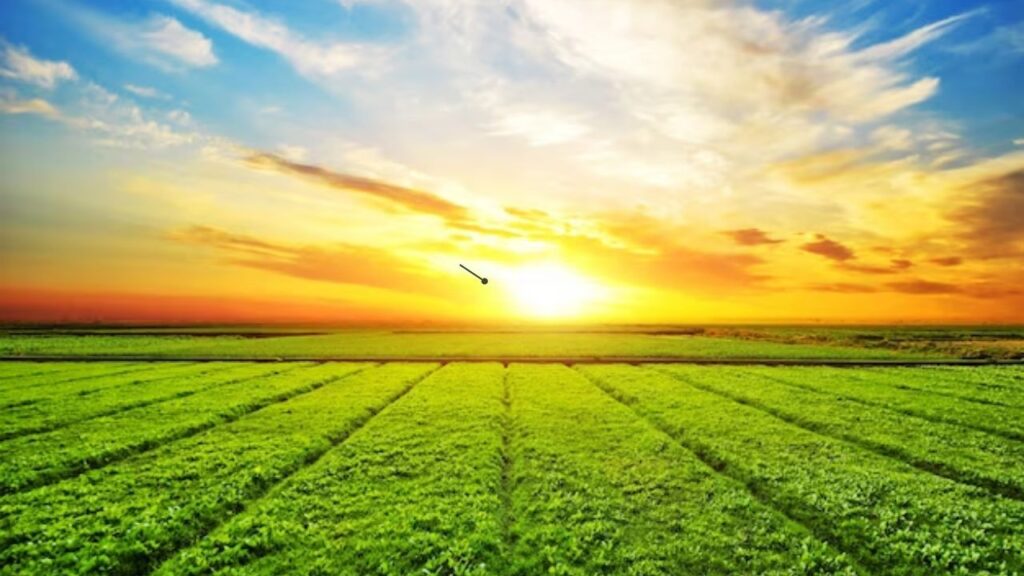Need of the Hour- Sustainable Agriculture
In the 21st era, where the natural resources are being depleted day by day, sustainable agriculture and organic farming have emerged as vital components in addressing the environmental, social and economic challenges which have been faced due to conventional way of farming by the farmers all over the world. In order to make the globe a better place to live in, these approaches which are to sustainable agriculture and organic farming leading to maintenance if ecological balance, biodiversity conservation and the well being of the farmers as well the whole cycle connected with the farmers. In this given piece of article, we are going to highlight the benefits, importance and challenges which are being faced in sustainable agriculture and organic farming, also highlighting their potential to develop a more sustainable and durable future of the earth.
What is Sustainable Agriculture
Sustainable agriculture is a holistic approach to agricultural activities which aims to meet the major needs of current society, along ensuring the productivity of the future generations to meet their needs. Sustainable farming is actually the integration of ecological, economic and social principles to create farming systems that are eco friendly economically sustainable and socially just for all the individuals and groups connected to this chain.
Also Read: Unveling the wonders of moringa oleifera
Conservation agriculture– it is a key component of sustainable farming, which aims to emphasize on minimum soil disruption, rotation of the crop, and cover crops used in sustainable farming. Use of such practices helps to maintain the original structure of the soil, reduction of the soil erosion which is being caused due to hazardous activities in agriculture, enhance water retention capacity of the soil in area, with all these activities contributing to increased soil fertility.
b) Agro ecology- it is the practice of integrating the ecological practices which supports the environment into agriculture systems by promoting biodiversity, conservation of natural environmental resources and reduction of the chemical usage in agricultural practices. By using the natural practices which enhance the resilience power of soil, in order to enhance the structure and ecological balance of the earth.
The Representation of Sustainable Agriculture
Organic farming usually represents a specific set of agriculture practices that strictly prohibit the use of artificial pesticides, insecticides and other fertilizers which are used usually in order to get a good produce each season. Sustainable agriculture basically relies on the natural methods of farming such as crop rotation, composting and using natural biological pests and thermocompost. In organic agriculture we use green manure and other green fertilizers in order to increase the quality and quantity of the produce which will help the consumers, the stakeholders as well as the earth by returning earth the minerals which we have taken from it.
1. Soil Health in Organic Farming– Sustainable farming places a strong emphasis on the need of good soil health, recognizing the need of soil as one of the important living ecosystem. Maintaining the soil health can be done by taking up the practices which will help in enhancement of the soil structure and the nutrient availability in the soil and the ecology of the soil.
2. Reduction of the negative impact on environment- reduced use of chemical fertilizers and substances in the soil, while we work in organic farming, help in contributing to the environment and the preservation of water quality. Organic farming and using system which causes neutral harm to the environment and contribute to mitigating the climate changes by promoting carbon sequestration in the soil and environment.


Benefits of Sustainable and Organic Farming
1. Environmental Conservation and Maintenance- sustainable farming and organic practices which are followed by the farmers help in maintaining the ecology and balance of the environment and makes atmosphere a better place to be in. this is basically done by minizing the use of artificial inputs like artificial fertilizers, promoting biodiversity and preservation of the natural resources of mother earth.
2. Health and Nutritional Benefits- organic and sustainably produced food is considered to be healthier because of presence of less artificial fertilizers and residues. The focus here is on natural food and nutrients and soil health which can lead to more nutrient dense crops beneficial for the consumers as well as the environment.
3. Economically Reliable for the farmers- organic and sustainable agriculture is beneficial in order to increase the reliability of the farmers and the environment. The farmer here do not depend on the synthetic farming practices such as chemical fertilizers and other chemical compounds which have a huge negative on the soil and the crop quality, as well as environment as a whole.
Challenges in Sustainable Agriculture
There are various challenges faced by the farmers and organizations who are indulged in organic and sustainable farming which may include,
1. Transition Period- transition period of shifting from inorganic to organic farming takes much time as the soil is already contaminated with the chemicals which have been used in the past. The adjustment in using the organic farming in the initial days makes it difficult for the farmers.
2. Certification costs- certification for the organic farming also is very costly for many people, especially the lower scale farmers who are not having much land to bear the costs of the certification on an international level.
Conclusion: Sustainable agriculture and organic farming, usually offer good pathways and opportunities to the farmers and organization, in order to face the various challenges which are usually faced by the person while doing sustainable and organic farming. With the purpose of giving priority to ecological health, biodiversity and the proper well- being of the farmers, customers and environment as a whole, these activities and propaganda paves a proper way for providing more sustainable and resilient agricultural practices and better future of the earth. In today’s era, as the customers are becoming conscious about the organic and pure products that they are going to consume, it becomes much important for the farmers to adhere to the expectations of the customers and the environment which is providing us all the nutrients needed for proper growth of individual and environment as a whole.

